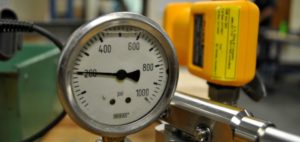Metrology Glossary: Pressure Gauge
What is a Pressure Gauge?
A pressure gauge is an instrument designed to quantify the force exerted on a surface in relation to the surface’s area by a fluid. There are two primary types of pressure gauges: analog and digital. Analog pressure gauges rely on a pointer and a dial to convey pressure measurements, whereas digital pressure gauges present the pressure value in numerical format on a screen. Pressure gauges can also be categorized based on the specific pressure they are designed to assess. Vacuum gauges measure pressure levels beneath atmospheric pressure, while compound gauges can gauge pressure both above and below atmospheric pressure.
How are Pressure Gauges Used?
Pressure gauges are used in many process applications to help operators monitor and maintain safe pressurization in their systems. Usually paired with other pressure management equipment such as safety relief valves or rupture discs, pressure gauges are an integral part of a larger system designed to ensure safe operation, and avoiding catastrophic failure in a line or even an entire process.








